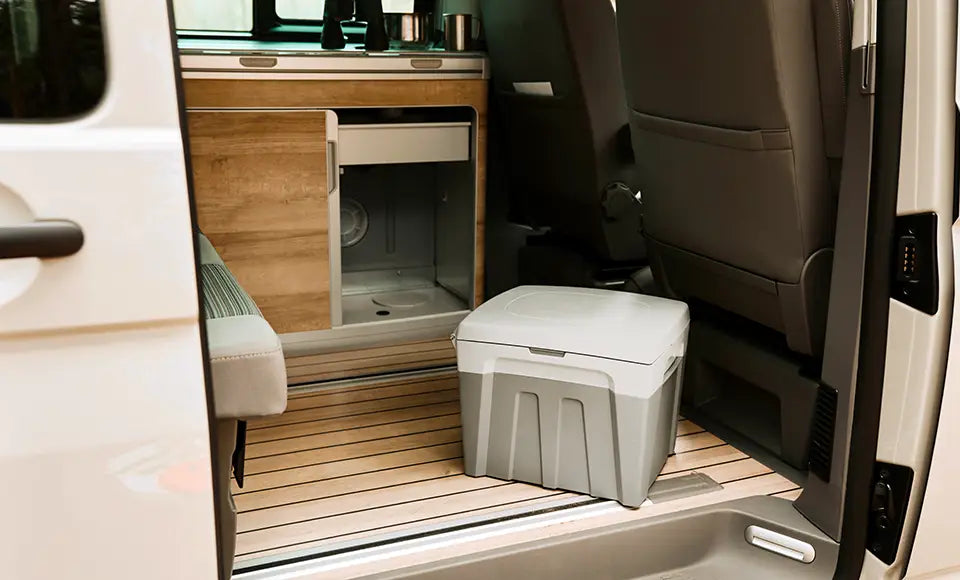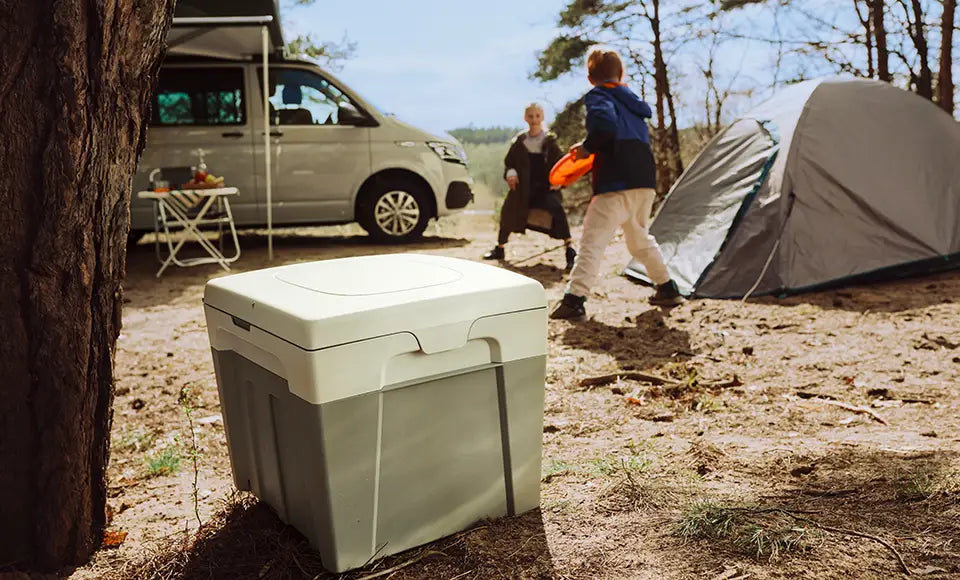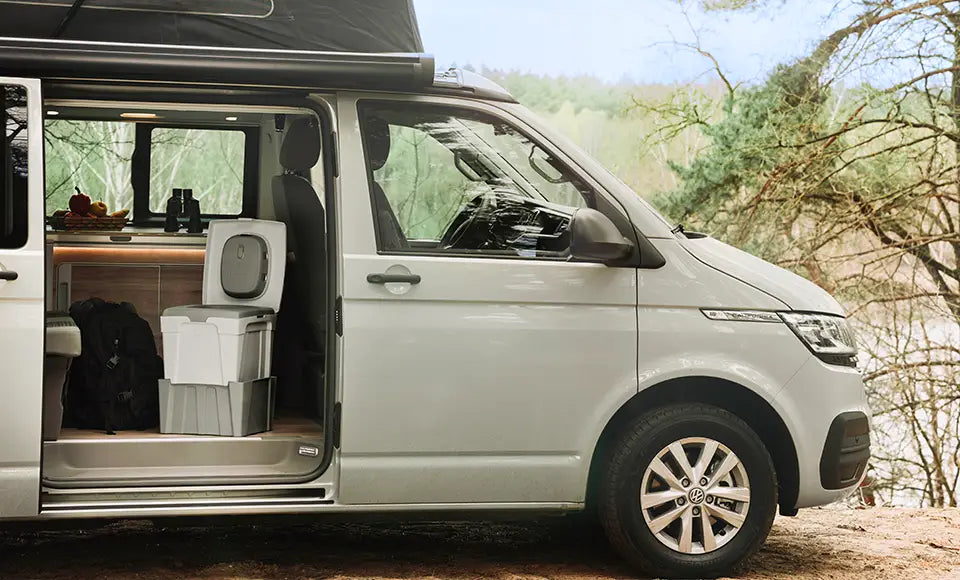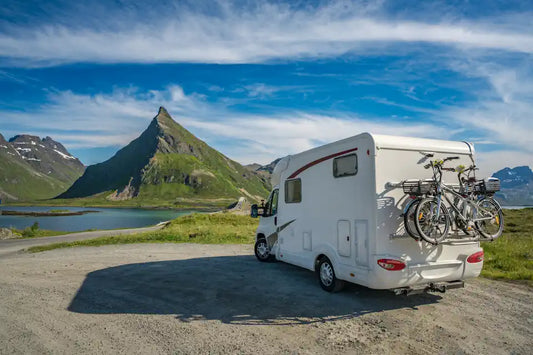Planning a road trip in your camper and not sure what to consider when selecting a camper toilet? Don't worry, we're here to guide you through the process. While choosing the perfect camper toilet for your adventure may initially appear daunting, with our comprehensive guide, you'll find it's a breeze. But let’s start at the beginning!
What types of camper toilets are there?
Basically you can choose between convential toilets, chemical toilets and composting toilets. Here’s how they work:
- Conventional toilets need to be installed permanently and connected to a water tank, making this a rather complicated and expensive solution, which only works in some RV’s but not in vans. Usually this type of toilet is not the preferred camper toilet.
- Chemical toilets are one of the most common solutions out there when it comes to camper toilets. There are installable and portable versions which require no water connection and instead rely on chemicals. This solution entails serious drawbacks. Especially emptying and disposing of the toilet waste is difficult, messy and requires special disposal stations.
- Composting toilets may be the most underrated camper toilets. These toilets do not require water nor chemicals, which means you can be completely self-sufficient and independent. The best part is that these toilets are 100% odorless and offer easy options for emptying and disposal.
Which camper toilet is right for you?
When it comes to camper toilets, everyone’s needs are a bit different, which means there’s no universal solution that is perfect for everyone. But if you really think about it, you can break your search for the best camper toilet down to three relatively simple considerations:
- Is it possible?
- Is it practical?
- Is it affordable?
These questions might sound trivial at first, but they really give you all the answers you need.
Let’s explore this in more detail.
Is it technically possible to use a certain camper toilet model?
Keep in mind, you have three options: conventional, chemical, and composting toilets. Putting a conventional toilet into your vehicle can be complex, which is why many prefer composting or chemical options for their camper.
If you have a large RV with a bathroom and water tank, installing a conventional toilet might be feasible, though it involves considerable work.
Fortunately, there are no-installation alternatives for RV's like portable composting or chemical toilets. These mobile toilets come in various sizes. Compact dimensions are crucial, especially if you travel in a small van or car. Therefore it’s a must to compare dimensions of different models and only consider those that actually fit into your vehicle.
Remember, right now we’re only talking about what is possible. Whether or not a toilet system is easy to handle is another question. One that we’ll answer in the next section.
How practical is the camper toilet in question?
Once you've determined what's feasible for your specific situation, it's time to evaluate the comfort of your options.
In terms of using the toilet itself, all options function similarly to regular toilets and therefore offer a high level of convenience.
However, a big challenge arises when it's time to empty and clean the waste containers.
Conventional toilets direct all waste into the black water tank, requiring regular emptying at a specialized waste disposal station and thorough tank cleaning. Similarly, in chemical toilets, all waste accumulates in one container, demanding disposal at a designated station and extensive cleaning. Both options pose significant challenges for emptying, disposal, and cleaning.
On the other hand, composting toilets with a separating mechanism offer distinct advantages. Waste is divided into liquid and solid containers, simplifying disposal. Solid waste can be disposed of like regular household waste, comparable to used diapers. Urine can be emptied into a regular toilet. This makes emptying on the go super easy and hygienic. Just remove the containers from your composting toilet and transport them to your desired emptying location. Then, dispose of the solid waste by removing the inlay and placing it in the waste, and pour the liquid waste into a regular toilet. At no point is there direct contact with feces, and there's no requirement for special disposal stations. Here you can find out more about emptying a composting toilet.
In addition to considering the emptying process, it's essential to think about the necessity of accessories: conventional and chemical toilets rely on chemicals, which can limit your independence. In contrast, composting toilets require no water, chemicals, or electricity, providing true self-sufficiency. Ideally, adding a bit of litter to your solid waste helps it dry out and become odorless, but even without using litter, you can use your composting toilet just fine.
Finally, when choosing a portable camper toilet, consider the impact of weight on overall comfort. A lighter portable camper toilet is easier to lift and maneuver, enhancing overall usability.

How much does a camper toilet cost?
Price is a major factor for most individuals. Installing a conventional toilet is typically the most expensive option. Together with the challenging installation process and tedious emptying and disposal procedures, the high price is yet another disadvantage of this solution. Why pay more, when it doesn’t make your life easier?
When comparing the prices of chemical and composting toilets, you'll discover a wide range of products available, spanning from very affordable options to more expensive ones. It's important to note that with chemical toilets, regular purchases of chemicals are necessary, adding to the overall cost. Ultimately, a budget-friendly composting toilet might prove to be the most cost-effective solution, while also offering optimal comfort in terms of emptying, disposal, and cleaning.
Conclusion: Choose your camper toilet wisely
As mentioned earlier, camper toilets are not one-size-fits-all. Conventional toilets are generally not the preferred choice for campers due to their challenging installation process, difficult emptying of the black water tank, and high cost. While chemical toilets are somewhat cheaper and easier to transport, they still require expensive chemicals and the emptying and disposal process are quite a hazzle. On the other hand, composting toilets offer high levels of comfort, affordability, and versatility, fitting into practically any vehicle.

For an exceptionally comfortable experience, we recommend our TROBOLO WandaGO. This model features a compact transport size yet offers an adjustable seat height thanks to its stacking function. If you don't require a regular seat height, you can opt for the WandaGO Lite, which is even lighter and more affordable than its bigger brother.
The TROBOLO WandaGO in action
Please note: This video features the 2023 model of the TROBOLO WandaGO.
Need a more individual solution? Use our DIY set to build a fully functional composting toilet exactly to your specifications. With our detailed guidelines on how to build a DIY composting toilet the whole process will become very easy and all you have to do is follow our step-by-step instructions.



